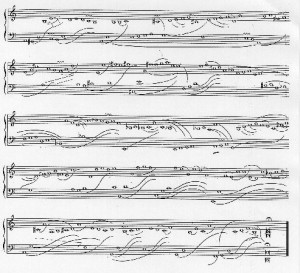Louis Couperin (part of the same family as François) lived to 35, and was best known during his lifetime as one of the most important keyboardists in Paris. None of his music was published during his lifetime, but he is often credited as the creator of the baroque French harpsichord tradition. While I am much more familiar with François’s music, I came across some of Louis’s music while I was preparing for my doctoral exams. The ‘unmeasured prelude’ – a prelude that was written down rather then simply improvised – brought about a significant change to the composed suite. While the suite consisted pretty much entirely of dance movements before L. Couperin’s time, the idea of notating the prelude brought about a significant change… composing the what would traditionally be seen as improvised of course provided the opportunity to play with the idea of compositionally showing off before the more traditional movements would begin. While they mostly consisted of figurations of changes of harmony, the notation itself was particularly beautiful. Mostly just whole notes and slurs that showed phrasing. I find the pages of these works that I have seen as being fairly avant-garde, even for modern times. Here is a work within a musical tradition that had become rather measured and rhythmic, and it removes this rhythmic aspect quite brutally. Surely these ‘whole notes’ could not be performed as whole notes at any sort of reasonable tempo. The notation implies a flexibility of execution, and at the same time a sense that these notes overlap and build up texture. I imagine his work as an organist influenced these notation decisions (in the same way that Bruckner’s organ playing influenced his orchestration).
The five discs I have were a box set I found used for $20. It features 133 movements that make up Louis Couperin’s knows works for harpsichord. They are great pieces and they are also the work that will lead to greater works later in history. As with most composers who die young but leave a large impression, I wonder what Louis’ career would have led to. Would there have been other innovations? Other attempts to capture in notation what performers do when they realize works out of thin air? Would he have been seen as ‘Le Grand’ Couperin rather then François? And why should I feel a need to wonder these things? He is seen as the father of one of the grandest traditions of the Baroque period – not to shabby.


